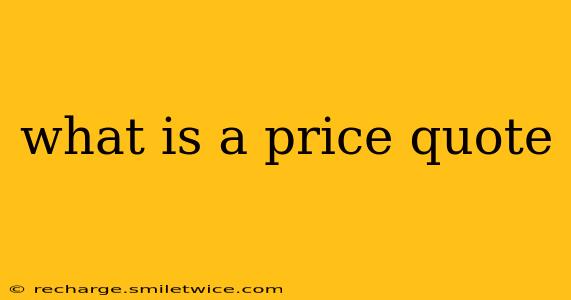What is a Price Quote? A Comprehensive Guide
A price quote, often simply called a quote, is a formal document or statement that provides a prospective buyer with the price of a product or service. It outlines the cost associated with a specific request, detailing the items, quantities, and associated charges. Think of it as a snapshot of the cost at a particular point in time, subject to change depending on various factors. It’s a crucial communication tool used in various business transactions, from small purchases to large-scale projects.
This guide will explore the intricacies of price quotes, answering common questions and offering insights into their importance in business dealings.
What information is typically included in a price quote?
A comprehensive price quote should include the following key elements:
- Company Information: The name, address, contact information, and potentially the logo of the company providing the quote.
- Quote Date: The date the quote was issued – crucial for determining its validity.
- Quote Number: A unique identifier for tracking and referencing the quote.
- Customer Information: The name and contact information of the prospective buyer.
- Description of Goods or Services: A clear and detailed description of the products or services being quoted, including specifications, quantities, and any relevant technical information.
- Unit Prices and Total Price: Clearly stated unit prices for each item and a clearly calculated total price, including any applicable taxes.
- Payment Terms: Information on payment methods accepted, due dates, and any discounts offered for early payment.
- Delivery Information (if applicable): Details about shipping costs, delivery dates, and any associated charges.
- Validity Period: The duration for which the quote remains valid. This is important as prices may fluctuate.
- Terms and Conditions: Any relevant terms and conditions, including warranties, return policies, and liability clauses.
What is the difference between a price quote and an invoice?
While both relate to pricing, a price quote and an invoice serve distinct purposes:
-
Price Quote: A prospective cost estimate issued before an agreement is reached. It's an offer, not a demand for payment.
-
Invoice: A formal request for payment issued after an agreement is made and goods or services have been delivered or rendered. It's a demand for payment for completed work.
How long is a price quote typically valid for?
The validity period of a price quote varies depending on factors like market fluctuations, material costs, and the complexity of the project. Quotes can range from a few days to several weeks, and this timeframe is usually explicitly stated in the quote itself. Always check the quote for its expiration date.
What are the different types of price quotes?
There are various types of price quotes, tailored to the specific context of the transaction. These may include:
-
Fixed-Price Quote: A quote where the price is fixed and will not change, barring unforeseen circumstances explicitly stated in the quote.
-
Time and Materials Quote: A quote based on the estimated time spent on a project and the cost of materials used. This is more common for projects with less defined scopes.
-
Unit Price Quote: A quote specifying a price per unit, allowing for flexibility in quantities ordered.
-
Negotiated Quote: A quote where the price is subject to negotiation and can change based on discussions between the buyer and seller.
Can a price quote be legally binding?
A price quote, in and of itself, is generally not legally binding. However, it can become legally binding if specific terms and conditions make it a formal offer, and the buyer accepts those terms in writing. Consult legal counsel if you have concerns about the binding nature of a price quote.
Understanding price quotes is essential for both buyers and sellers. By grasping the components, differences with invoices, and potential legal implications, you can navigate business transactions more effectively and confidently.
